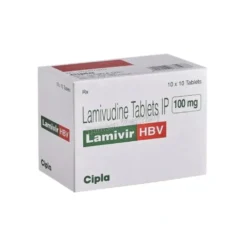Ritomune 100mg Ritonavir Tablets
$60.00 – $162.00Price range: $60.00 through $162.00
Ritomune 100 is used to treat HIV infection. It contains Ritonavir, which works by inhibiting the HIV protease enzyme, helping to reduce the amount of virus in the body and improve immune function.
| Pack Size | Price | Price / Unit | Quantity | |
|---|---|---|---|---|
| 60 Tablets | $60.00 | $1.00/ unit | ||
| 120 Tablets | $114.00 | $0.95/ unit | ||
| 180 Tablets | $162.00 | $0.90/ unit |
Looking for bulk / B2B pricing? | Send Inquiry |

| SKU | 11174 |
| Manufacturer | Cipla Limited |
| Categories | HIV & Herpes |
| Delivery Time | 10 - 14 Working Days |
| Strength | 100mg |
Introduction to Ritomune 100mg Tablets
Ritomune 100mg Tablet is an antiviral or antiretroviral medicine. It is used in the treatment of HIV infection. It stops the virus from producing new viruses and clears up your infection.
Ritomune 100mg Tablet should be taken with food, as this increases the absorption of the medicine into the body. You should take it in the dose and duration as advised by your doctor.
Taking it at the same time every day will help you to remember to take it. Do not stop taking it until you have finished the complete course, even when you feel better. If you stop taking this medicine too early then infection may return or worsen.
Uses of Ritomune 100 mg
- Treatment of HIV/AIDS
- HIV-1 Protease Inhibition
- Prevention of HIV Transmission (Post-exposure Prophylaxis)
- Boosting the Effectiveness of Other Antiretroviral Drugs
How Does Ritomune 100 Works?
Ritomune 100 mg (ritonavir) works by inhibiting the HIV protease enzyme, which is crucial for the replication of the HIV virus. By blocking this enzyme, Ritomune prevents the virus from maturing and replicating, thereby reducing the viral load in the body.
This helps in controlling the progression of HIV infection and boosts the effectiveness of other antiretroviral medications when used in combination. Ritomune is often used as part of a combination therapy to improve overall treatment outcomes for HIV/AIDS patients.
Side Effects of Ritomune
- Nausea
- Vomiting
- Diarrhea
- Stomach pain or discomfort
- Headache
- Fatigue
- Dizziness
- Changes in taste
- Skin rash or itching
Dosage of Ritomune 100 mg
Ritomune 100 mg Tablet contains an active ingredient, Ritonavir, which is used in the treatment of HIV infection. This medicine is available in different substitutes & strengths & has got to be purchased or given on doctor’s prescription only. You must consult your physician for adjustment of dosage & time of the medicine because age and severity of the disease differ from person to person and it can only be best judged by your doctor.
Adults are advised to take Ritomune 100 mg Tablet at a fixed time with food as instructed by your Doctor. You must take Ritomune 100 mg Tablet regularly on time for better results.
How to Manage Side Effects?
- Consult a Healthcare Professional
- Follow Prescribed Dosage
- Take with Food
- Stay Hydrated
- Be Cautious with Activities
- Monitor Blood Tests
- Inform Your Doctor About Other Medications
- Stick to the Treatment Plan
Warnings & Precautions
Here are the warnings and precautions for Ritomune 100 mg (ritonavir):
1. Liver Problems (Hepatotoxicity):
- Ritomune can cause liver damage, particularly in patients with pre-existing liver conditions (e.g., hepatitis). Liver function should be monitored regularly during treatment. Seek medical attention if you experience symptoms like yellowing of the skin or eyes, dark urine, or upper stomach pain.
2. Allergic Reactions:
- Severe allergic reactions (e.g., rash, swelling, difficulty breathing) can occur. If you experience these symptoms, stop the medication immediately and seek emergency medical help.
3. Drug Interactions:
- Ritomune can interact with many medications, including other antiretroviral drugs, antifungal medications, and antidepressants. These interactions may alter drug effectiveness or increase the risk of side effects. Always inform your doctor about all medications you’re taking.
4. Heart Conditions (Arrhythmias):
- Ritomune may cause irregular heart rhythms (arrhythmias). Patients with heart disease or arrhythmias should use Ritomune with caution. Inform your healthcare provider if you have a history of heart problems.
5. Pancreatitis:
- Ritomune has been associated with pancreatitis (inflammation of the pancreas). If you develop severe abdominal pain, nausea, or vomiting, discontinue use and seek immediate medical attention.
6. Kidney Function:
- Ritomune may affect kidney function. Kidney function should be closely monitored, especially in patients with kidney disease.
7. Pregnancy and Breastfeeding:
- Ritomune is generally considered safe for use during pregnancy as part of an antiretroviral regimen, but you should only take it under the guidance of your doctor. It is not recommended to breastfeed while taking Ritomune due to potential transmission of HIV.
8. Blood Sugar Levels (Hyperglycemia):
- Ritomune may increase blood sugar levels, so patients with diabetes should monitor their blood glucose levels more frequently.
9. Bone Health:
- Long-term use of Ritomune can affect bone density and may increase the risk of bone fractures. Discuss this with your doctor if you have concerns about your bone health.
10. Alcohol Use:
- Limit alcohol consumption while taking Ritomune, as alcohol can exacerbate side effects such as liver damage and gastrointestinal issues.
11. Dosage Adjustments:
- Dosage adjustments may be needed for individuals with kidney or liver problems, or those taking other medications that interact with Ritomune.
Frequently Asked Questions
1. Can I take ritomune if I’m pregnant or breastfeeding?
Ritomune is generally considered safe during pregnancy as part of an HIV treatment regimen, but always consult your doctor before use. Breastfeeding is not recommended while taking Ritomune due to the potential risk of HIV transmission through breast milk.
2. Why is ritonavir used along with lopinavir?
Ritonavir is available with lopinavir as a fixed dose combination as it improves the availability of lopinavir which helps in increasing activity against HIV
3. Is ritonavir a protease inhibitor?
Ritonavir, a protease inhibitor
4. How does ritomune 100mg tablet work and what does it inhibit?
Ritomune 100mg Tablet belongs to a class of medication called protease inhibitors. It inhibits protease enzymes from breaking down proteins and thus prevents HIV from multiplying inside the body. It does not cure HIV completely but reduces the chances of getting acquired immunodeficiency syndrome (AIDS) and HIV related infections or cancer
| Pack Size | 180 Tablets, 120 Tablets, 60 Tablets |
|---|---|
| Price/Unit | $0.90/unit, $0.95/unit, $1.00/unit |
Be the first to review “Ritomune 100mg Ritonavir Tablets” Cancel reply
Related Products
HIV & Herpes












Reviews
There are no reviews yet.